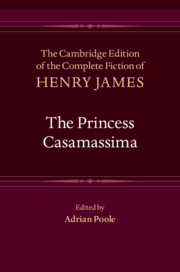Book contents
- Frontmatter
- Contents
- List of Illustrations
- Acknowledgements
- List of Abbreviations
- General Editors’ Preface
- General Chronology of James’s Life and Writings
- Introduction
- Textual Introduction
- Chronology of Composition and Production
- Bibliography
- The Princess Casamassima
- Glossary of Foreign Words and Phrases
- Notes
- Textual Variants I: Substantive Variants up to Copy Text
- Textual Variants II: Substantive Variants after Copy Text
- Emendations
- Appendix: Preface to New York Edition
XXIII
Published online by Cambridge University Press: 11 April 2021
- Frontmatter
- Contents
- List of Illustrations
- Acknowledgements
- List of Abbreviations
- General Editors’ Preface
- General Chronology of James’s Life and Writings
- Introduction
- Textual Introduction
- Chronology of Composition and Production
- Bibliography
- The Princess Casamassima
- Glossary of Foreign Words and Phrases
- Notes
- Textual Variants I: Substantive Variants up to Copy Text
- Textual Variants II: Substantive Variants after Copy Text
- Emendations
- Appendix: Preface to New York Edition
Summary
He was in the library, after luncheon, when word was brought to him that the carriage was at the door, for their drive; and when he went into the hall he found Madame Grandoni, bonneted and cloaked, awaiting the descent of the Princess. “You see I go with you. I am always there,” she remarked, jovially. “The Princess has me with her to take care of her, and this is how I do it. Besides, I never miss my drive.”
“You are different from me; this will be the first I have ever had in my life.” He could establish that distinction without bitterness, because he was too pleased with his prospect to believe the old lady's presence could spoil it. He had nothing to say to the Princess that she might not hear. He didn't dislike her for coming, even after she had said to him, in answer to his own announcement, speaking rather more sententiously than was her wont, “It doesn't surprise me that you have not spent your life in carriages. They have nothing to do with your trade.”
“Fortunately not,” he answered. “I should have made a ridiculous coachman.” The Princess appeared, and they mounted into a great square barouche, an old-fashioned, high-hung vehicle, with a green body, a faded hammer-cloth and a rumble where the footman sat (the Princess mentioned that it had been let with the house), which rolled ponderously and smoothly along the winding avenue and through the gilded gates (they were surmounted with an immense escutcheon) of the park. The progress of this oddly composed trio had a high respectability, and that is one of the reasons why Hyacinth felt the occasion to be tremendously memorable. There might still be greater joys in store for him — he was by this time quite at sea, and could recognise no shores — but he would never again in his life be so respectable. The drive was long and comprehensive, but very little was said while it lasted. “I shall show you the whole country: it is exquisitely beautiful; it speaks to the heart.” Of so much as this his hostess had informed him at the start; and she added, in French, with a light, allusive nod at the rich, humanised landscape, “Voilà ce que j’aime en Angleterre.”
- Type
- Chapter
- Information
- The Princess Casamassima , pp. 236 - 245Publisher: Cambridge University PressPrint publication year: 2020

